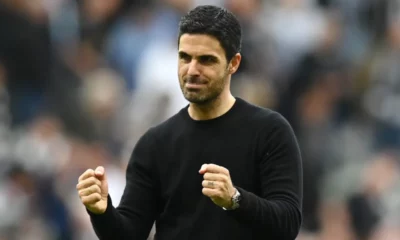Arsenal
Who Replaces David James?
By Thomas Curtis.
Now that England’s dismal world cup is over, all the talk of ‘where do we go from here’ begins again in preparation for Euro 2012. One of the main focal points of this debate must be on the successor of David James as England’s number one.
Joe Hart has the ability and the time to develop into a solid goalkeeper, leaving him as the obvious choice to replace David James. Beyond him the list of potential number one’s is alarmingly short. Robert Green is 30, and short of having a couple of spectacular seasons in the Premier League cannot be seriously considered as a definite candidate for Euro 2012. It is likely that he will join Paul Robinson and Scott Carson in the list of goalkeepers whose international careers were ended by high profile errors whilst wearing the England shirt.
David James, at nearly 40 years old, has surely taken his final bow at international tournaments. Speaking recently to the BBC, former Germany legend Oliver Kahn made a glaring statement that highlights the issue facing the England national squad.
“English clubs have foreign goalkeepers” he said, “which makes it hard for the national team and makes it difficult to develop a goalkeeper”.
As preparations start for the next international tournament, perhaps it’s time to follow the old football philosophy of starting from the back. The fact that not one of England’s top clubs regularly fields an English goalkeeper opens questions about the quality of English players available to fill this position. All of Manchester United, Manchester City, Arsenal, Liverpool, Tottenham, Chelsea and Aston Villa (the top seven clubs in English football last season) have foreign goalkeepers as their first choice. Even England’s other recent European representatives, Fulham and Everton, have Australian and American goalkeepers respectively.
The club that finished highest in the Premier League last season with a regular English goalkeeper was Birmingham City in ninth place, where Joe Hart was on loan. Following them was Blackburn with the internationally exiled Paul Robinson as first choice, and current number one David James got relegated with Portsmouth. As Kahn suggests, without a goalkeeper playing at the top level of the domestic game, England cannot expect to develop world class stoppers to the standard of those produced by other major football nations. The majority of England’s national outfield team appear regularly in European competitions, and most represent the top seven clubs in the Premier League. Yet English goalkeepers are not found until further down the league table, and are seldom seen on the European stage.
Looking at who should have been England’s big name rivals at the world cup, such as the Netherlands, Brazil, France, Argentina, Germany and Spain, the line ups all start with highly experienced, and highly rated, goalkeepers. Most, if not all of these goalkeepers play their club football at top European clubs, or have at least had experience playing in the Champions League. Many of them have also got a collection of league winner’s medals.
Out of the previously mentioned nations, Spain has arguably the best selection of experienced goalkeepers available. All three of the goalkeepers in their World Cup squad (Casillas, Valdez and Reina) have played in at least one Champions League final. While Reina plies his trade at suffering Liverpool in the Premier League, Casillas and Valdez have been regular performers for Barcelona and Real Madrid, the two most successful clubs in Spain. The Brazilians have Julio Cesar, debated as the current best in the world, who won the treble last season in Italy with Inter Milan (including the Champions League). They also have Gomes from Tottenham, who have qualified for the Champions League next season. He already has experience in this competition with former club PSV Eindhoven, one of the top clubs in Dutch football. Another big club in the Netherlands, Ajax, has their keeper Maarten Stekelenburg as the Netherlands number one. His deputy, Sander Boschker, plays for recent league winners FC Twente. Argentina has Romero, another Dutch league winner in 2009 with AZ Alkmaar. Kahn’s native Germany has Manuel Neuer, who has Champions League experience with Schalke 04, won the European under-21 trophy last year and is hotly tipped to join Bayern Munich after the World Cup. The other German goalkeepers consist of Hans-Jörg Butt, who already plays for Bayern Munich, and Tim Weisse, who finished third in the Bundesliga with Werder Bremen, also recent UEFA Cup finalists. Even the shambolic French national side have goalkeepers playing for Bordeaux, Marseille and Lyon: their top three clubs.
England does not currently have a number one option that has the experiences at the top end of European competition, and they cannot be expected to gain this experience by playing for mid-table teams. It’s not a question of age. Argentina’s Romero and Germany’s Neuer are both of similar age to Joe Hart, yet both have more experience at club and international level. Although Joe Hart is tipped as one for the future, he is not constantly tested against the world’s elite players in big game and big competition environments, such as the Champions League or Europa League. If he is to be classed in the same mould as the other promising young goalkeepers across the world, he will need the chance to learn at the highest possible level of the game.
Granted, the Premier League is one of the most competitive domestic championships in the world, which delivers its own tests and demands a high level of performance from all teams. Despite this, it is not the same as European and international competition, and there is a big difference between performing at a mid-table team and a top four team. Providing the national team with a world class stopper would not necessarily guarantee England success at future tournaments, just as it would not do any other nation. The difference being that younger goalkeepers from other nations are playing at the top level of their domestic leagues, and learning vital lessons needed for performing in international tournaments, which English goalkeepers are missing out on.
England has produced some great goalkeepers in the past, but inconsistency is obstructing the national side from progressing. Until this issue is resolved, or until clubs begin to look closer at home-grown talent, it seems likely that the possessor of the number one shirt will remain under scrutiny.
Who do you think will be England’s next No1?


















